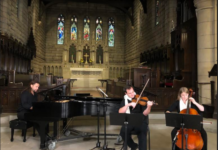The Stiefel Theatre announces that Marc Cohn has rescheduled for Saturday, May 30 @ 8PM. Tickets are $38 and $48. The show was originally booked for April 26, and was cancelled last week due to a family situation. It was rescheduled and confirmed today for May 30. (All tickets were refunded for the original date.) Tickets go on sale tomorrow, March 25. To buy tickets call the Stiefel at 785-827-1998 or go online to ticketmaster.com.
Marc Cohn
Grammy Award winning singer-songwriter Marc Cohn has been obsessed with pop music for as long as he can remember: “I was hooked from day one. My older brother had a band that rehearsed in our basement, so I heard Bacharach, The Beatles, Ray Charles, and Motown coming up through the floorboards from the time I was six years old. By the time I was eleven though, the Beatles were breaking up and singer-songwriters were breaking through, and a lot of that music really resonated for me”
1970 was a milestone for Marc – and for pop culture at large, given the unprecedented range of notable artists who made the charts that year. It was the momentous beginning of a new decade, and Cohn himself was moving closer to the precipice of young adulthood. The songs of that eventful year would stick with him forever, the way they would with anyone of a tender age just discovering the deeper meanings and life lessons – the romance, the sex, the sadness, the fun — to be gleaned from a seemingly simple pop tune.
Collaborating with longtime producer-arranger-multi-
As a songwriter and singer, Cohn combines the precision of a brilliant tunesmith with the passion of a great soul man. He’s a natural storyteller, balancing the exuberant with the poignant, and able to distill universal truth out of his often romantic, drawn-from-life tales. He similarly finds the emotional essence in the vintage songs he’s just recorded, even as he brilliantly reshapes his source material. Cohn’s own career took off at the turn of another decade, in 1990, with the recording of his critically acclaimed, self-titled debut disc, which yielded such classics in their own right as “Walking In Memphis,” “Silver Thunderbird,” and the lovely “True Companion.” For Cohn, 1970 – -which saw the release of Moondance, Bridge Over Troubled Water, and John Lennon/Plastic Ono Band to name but a few — “was still the golden age of the single, but was also the beginning of the golden age of the Album. Even while all these deeply personal and poetic records were being released, there was this eclectic mix of pop music on the radio; it was great to be able to explore that range on this record. Just as a consumer and a total music fan, if I saw a sequence on a record that had songs by Paul Simon, Badfinger, John Lennon, Cat Stevens, The Grateful Dead and Bread, I would immediately be intrigued, and I’d probably buy it just to find out how badly the artist had lost the plot! But somehow all those disparate styles and approaches to songwriting seem like they belong together.”
Says Leventhal, “Marc’s voice is the unifier. There’s a depth and a soulfulness that I don’t think people are aware of, and I really wanted to bring that out. That Creedence song, ‘ Long As I Can See the Light,’ is a good example. That track is as empty as can be and Marc just fills it with this unbelievably great singing.”
Instead of working out a firm set list or precise arrangements before they began to cut tracks, the pair went straight into Leventhal’s Manhattan studio to see what they could do with some of their favorite tunes, and they left the tape rolling. At first it was just the two of them, accompanied by the engineer/producer Rick DePofi; farther along, they invited in such guests as Aimee Mann, India Arie, Jim Lauderdale and up-and-coming vocal powerhouse Kristina Train. It was a process of discovery for the pair; Cohn and Leventhal recorded as they went along, often finding they’d have just about completed a song, with a finished vocal, after only a single day’s work.
At first, they considered digging up more obscure material, but Leventhal counseled Cohn to go with what he knew best: “I told him, you love great pop music, let’s just put it out there. They’re great songs, there’s a reason they were popular; let’s see if we can find our own unique versions of them. Let’s not copy them, let’s see if we can make it so that people feel they are hearing these songs for the first time. That’s a great challenge, and I like to think that we did it. I think Marc and I are a good combo because we both gravitate towards the same things and we understand good, fresh ways to approach material. Neither one of us were interested in doing anything verbatim.”
Hence, Bread’s sweetly chaste “ Make It With You,” performed as a duet with India. Arie, becomes a playfully sexy, Al Green/Willie Mitchell-style R&B groove with a gospel like call-and-response coda; as with the Rev. Al’s work, there’s no mistaking what the declaration of the song title means. Paul Simon’s ode to his fractured friendship with Art Garfunkel, “The Only Living Boy In New York,” is recast as a strikingly solitary folk song with a heartbreaking, intimate vocal. Badfinger’s “No Matter What,” featuring Aimee Mann, has yearning pedal steel rather than gleaming power-pop electric guitar. Cat Stevens’ “Wild World” is a bluesy shuffle, with Stevie Wonder-style harmonica — a cautionary tale narrated from a gritty, grownup point of view. The Box Top’s “The Letter” ( sung by the late Alex Chilton and covered in 1970 by Joe Cocker), has a similarly loose-limbed after-hours vibe; Cohn’s yearning to get back to his baby, but from the sound of it he may never leave the bar.
Says Leventhal, “The real epiphany was when we grabbed ‘Wild World’ and ‘The Letter.’ They had a kind of slinkiness to them, a late night feel. Once we embraced the more relaxed approach, everything felt right to us.”
“I’m singing in a different place in my voice on this record” says Cohn. “It was ultimately extremely liberating to just be the singer, not the songwriter, and to try to find the most interesting, unforced way to approach what we already knew were such beautifully written songs.
“To be honest” Cohn explains, “I don’t even view this as a ‘covers’ record in the traditional sense. Records like ‘Nick of Time’ by Bonnie Raitt, or ‘Raising Sand’ by Alison Krauss and Robert Plant were more the templates for me in the way these songs were arranged and performed. What those records taught me was that just because the singer didn’t write the songs, the record itself didn’t need to be any less of an original statement.”
In fact, Listening Booth:1970 represents a continuation of a creative resurgence for Cohn, ultimately brought on by one of the strangest and scariest events of his life. In 2005, while driving back to his hotel with his band and tour manager after a show in Denver, Cohn was shot in the head by a would – be carjacker. Although the bullet had to be removed from his left temple, it miraculously missed penetrating his skull by a centimeter, causing no physical damage and allowing him to be released from the hospital the next day. After working through a bout with post-traumatic stress syndrome, Cohn has been busier than ever. Ending a nearly ten-year absence from the studio, he released one of his most critically acclaimed records, Join The Parade, in 2007 and followed it with well over 150 shows across the country. “I had always had my priorities straight when it came to my family. For me, it never felt right bringing children into the world and then spending all your time in a studio or a tour bus. But that night in Denver somehow brought me a new appreciation for my work and my audience.”
Now, Listening Booth:1970 ultimately brings Cohn back to where he began– writing songs like ‘Walking In Memphis’ which spoke so eloquently about the transformative, healing power of music. Like that hit single, Listening Booth: 1970 is really the soundtrack to his life. As Cohn reflects, “It seemed like such a natural progression for me to do a record like this because, if you’ve been following my records from my first single, I have been paying tribute to musicians through my writing all along, from Al Green to Elvis to Levon Helm to Charlie Christian, It’s really been a touchstone for me. Now I’m just repaying a debt of gratitude to the artists who’ve changed my life and taught me how to do what I do.”




